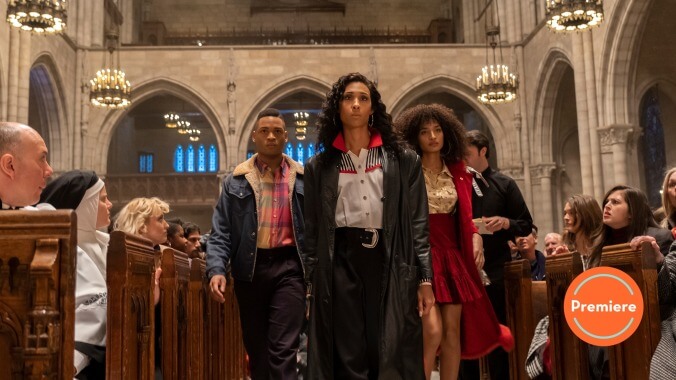Pose begins its second season in 1990 in a graveyard of nameless, endless tombs. It’s a striking visual representation of the way the world tried to strip HIV-positive people of their humanity, punishing and isolating them even in death. It’s a grand statement, but it’s also an intensely personal one, because we are here with Pray Tell and with Blanca, who have both lost so many loved ones to this epidemic and who have to fight just to be seen. Pose roots its stories about HIV and the systemic oppression of queer, trans, and black and brown lives in intensely personal narratives. And in its season two premiere, it also sharply balances these dark realities with joy, with beautiful moments that make these characters feel very much alive and real and radical.
Every ballroom scene is a reminder of the powerful, stunning way that this community comes together to celebrate their lives, their bodies, their humanity. It’s spectacle, but it’s also revolution. As Pray Tell puts it, it’s not merely “a scene.” The ballroom scenes on Pose are always some of its finest work, the beating heart of the series. And in this premiere, one of those ballroom scenes features the emotional climax of the episode, setting up what is seemingly going to be one of the internal conflicts among the main characters this season when Pray Tell explodes at Elektra for not showing up to the die-in protest at the church. Pose’s characters are becoming more political (more on that in a bit), and these moments root this show in its history and also present a very nuanced look at activism and the intersections of identity and politics.
Pose also understands that the personal is political. These characters aren’t just mouthpieces for queer and trans liberation; these are their lived experiences. Angel might be able to pass as cis in certain contexts, affording her certain privileges like making it to the finals of a modeling contest, but she’s still vulnerable to transphobia as well as discrimination for being a sex worker. When the photographer assaults Angel by forcing her to undress so he can take photos of her body without her consent, the direction and camerawork centers Angel and the way she experiences this moment but without feeling exploitive—a balance that’s difficult to strike. Blanca and Papi’s vengeance is satisfying without being overwrought. And throughout it all, Pose lets Angel keep her humanity, even as this man tries to strip her of it.
Throughout the premiere, Pose manages to find the right balance between realism and optimism, channeled best through Blanca. Blanca’s surge of hope and excitement in the wake of the release of Madonna’s “Vogue” is radiant if a bit naive. As an audience, we know that Madonna’s “Vogue” was far from a revolution starter and is a very stark example of cultural appropriation. Pray Tell is here to voice that side of things, pointing out to Blanca that history tells a different story about what it really means when the “mainstream” adopts the art and culture of marginalized folks. Rarely does it amplify those marginalized voices; it crushes them. But Pose doesn’t punish Blanca for her idealism or make a fool out of her. The show genuinely celebrates her spirit while also couching it with the valid concerns Pray Tell raises. Pose itself seems to exist somewhere between their two perspectives.
Sandra Bernhard’s character becomes more significant in the premiere, which does a lot to increase the show’s lesbian representation (which is pretty glaringly nonexistent in the first season). More than just a nurse, Judy is an active member of ACT UP, the advocacy group founded in 1987 that still exists today. Again, Pose is setting a clear course for its second season by introducing ACT UP and the political realities of fighting AIDS. The way the premiere delves into the divides within the LGBTQ community is smart and meaningful, too. Yes, this is a resilient and inspiring community, but it has its own hierarchies within it. Rich white gay men could afford drugs to help battle the progression of the virus, and Pray Tell is a little skeptical of ACT UP at first, convinced it’s just a group of these privileged white gay men until Judy shows him otherwise.
The premiere’s pacing is admittedly imperfect, and there’s a bit of a sense that the show doesn’t quite know what to do with Elektra right now. She’s still somewhat a foil to Blanca, but the organic and visceral nature of Pray Tell’s argument with her at the ballroom isn’t matched later on when Elektra blows up at the rest of them at dinner. Her reaction is outsized and reads as drama for the sake of drama instead of hinging on the careful character work otherwise present in the premiere’s short- and long-term conflicts. Sometimes the overlong runtimes for Pose’s episodes work against it. But at least the loose confines on its runtime allows for extended sequences like those at the ballroom. In its second season, Pose is still unlike anything else on television—a joyous yet real celebration of queer lives.
Stray observations
- That Marie Antoinette number is splendid. Sure, Elektra is often selfish, but she knows how to put on a damn show.
- The Pray Tell/Judy dynamic is great.
- The dynamic between Angel and Papi is also great. I love the relationships that sort of blur lines on this show. They seem like more than friends but aren’t explicitly romantic. I love this complicated family.

 Keep scrolling for more great stories.
Keep scrolling for more great stories.
